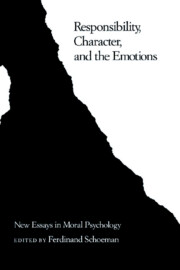Book contents
- Frontmatter
- Contents
- List of Contributors
- Acknowledgments
- 1 Introduction
- Part I Responsibility and Character
- 2 Identification and Wholeheartedness
- 3 Sanity and the Metaphysics of Responsibility
- 4 Unfreedom and Responsibility
- 5 Responsiveness and Moral Responsibility
- 6 Determinism and Freedom in Spinoza, Maimonides, and Aristotle: A Retrospective Study
- 7 Emotions, Responsibility, and Character
- Part II Responsibility and Culpability
- Index of Names
3 - Sanity and the Metaphysics of Responsibility
Published online by Cambridge University Press: 03 February 2010
- Frontmatter
- Contents
- List of Contributors
- Acknowledgments
- 1 Introduction
- Part I Responsibility and Character
- 2 Identification and Wholeheartedness
- 3 Sanity and the Metaphysics of Responsibility
- 4 Unfreedom and Responsibility
- 5 Responsiveness and Moral Responsibility
- 6 Determinism and Freedom in Spinoza, Maimonides, and Aristotle: A Retrospective Study
- 7 Emotions, Responsibility, and Character
- Part II Responsibility and Culpability
- Index of Names
Summary
Philosophers who study the problems of free will and responsibility have an easier time than most in meeting challenges about the relevance of their work to ordinary, practical concerns. Indeed, philosophers who study these problems are rarely faced with such challenges at all, since questions concerning the conditions of responsibility come up so obviously and so frequently in everyday life. Under scrutiny, however, one might question whether the connections between philosophical and nonphilosophical concerns in this area are real.
In everyday contexts, when lawyers, judges, parents, and others are concerned with issues of responsibility, they know, or think they know, what in general the conditions of responsibility are. Their questions are questions of application: Does this or that particular person meet this or that particular condition? Is this person mature enough, or informed enough, or sane enough to be responsible? Was he or she acting under posthypnotic suggestion or under the influence of a mind-impairing drug? It is assumed, in these contexts, that normal, fully developed adult human beings are responsible beings. The questions have to do with whether a given individual falls within the normal range.
By contrast, philosophers tend to be uncertain about the general conditions of responsibility, and they care less about dividing the responsible from the nonresponsible agents than about determining whether, and if so why, any of us are ever responsible for anything at all.
In the classroom, we might argue that the philosophical concerns grow out of the nonphilosophical ones, that they take off where the nonphilosophical questions stop.
- Type
- Chapter
- Information
- Responsibility, Character, and the EmotionsNew Essays in Moral Psychology, pp. 46 - 62Publisher: Cambridge University PressPrint publication year: 1988
- 90
- Cited by

